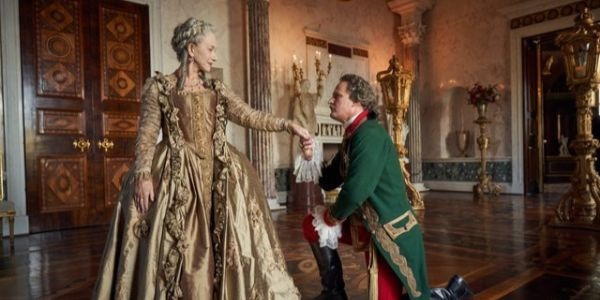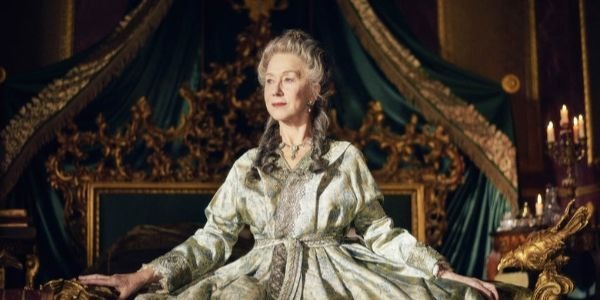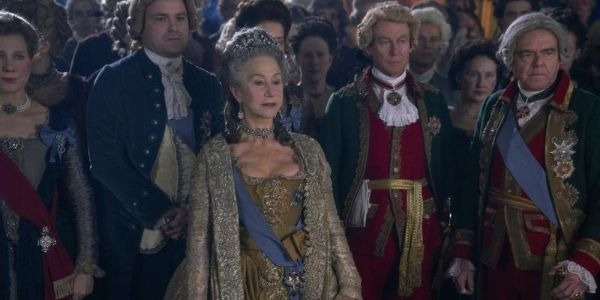CATHERINE THE GREAT Miniseries: Not Nearly As Great As Its Namesake

Rahul is a 3rd year Economics student at LSE but…
Once again in her career, the revered Helen Mirren finds a crown atop her head. However, this time her subjects (us, the audience) may not be so pleased. The Sky-produced and HBO-backed miniseries Catherine the Great is needlessly simplistic and, frankly, ugly. Although this particular portrayal of Russia’s longest-ruling female leader is refreshingly modern, viewers’ appetites for a gripping and emotional period drama are likely to left unsatiated.
Sex first, politics second
Catherine the Great is consistently aware of the importance that comes with telling the story of one of history’s most powerful women. How Catherine is presented in her environment determines how successful the show is in its feminist ambitions. In this vein, and with the knowledge of how women in power have often been presented onscreen before, Catherine the Great chooses to tell this tale through the lens of the titular regent’s sexual exploits. “War, war, war, war. All I want to talk about is sex,” she exclaims to her confidante, Countess Praskovya (Gina McKee). Free from the husband for whom she travelled to Russia (she overthrew him and took his throne), she can seek new romance with the resourceful men of her court.

This is an intriguing strategy that depicts the way a ruler’s policy can be affected by those with whom they share their deepest affection (and their bed). Most central to this narrative is the love that blossoms between Catherine and military statesman Grigory Potemkin (Jason Clarke). The pair become inseparable except in the instances when Grigory goes to war for Catherine; his lust for his empress results in bloodlust around the Black Sea. With this relationship acting as the spine of the show, it is a great shame that it slouches under the pressure of an onscreen pair that lacks sufficient chemistry and soon becomes annoying to endure.
Moreover, although the novelty of telling the story from this sexually expressive perspective ought to be rewarded, such a tactic came at a cost. The aspects of court intrigue – which, when done well, can be thrilling – are inert because of their simplicity. Yes, there are some familial politics surrounding the line of succession between Catherine and her snivelling son, Paul (Joseph Quinn). But we are seldom brought to care about their difficult relationship. The result, therefore, is an overly simplistic narrative that rushes through Catherine the Great’s 34-year-long reign.
As Catherine, Mirren is great
What stands out in Catherine the Great, and therefore becomes the object around which everything else tries to coalesce, is the show’s portrayal of Catherine. “Russia must be ruled by a man,” is one of the first and last sentiments expressed in the show. Mirren is therefore tasked with convincing us that Catherine was someone who could have remained in power for so long despite being surrounded by so much sexism. She succeeds on this count. Catherine is presented as intelligent, cautious, creative and ambitious.

By the show’s start, she is already the empress and has effectively renounced her German heritage to outwardly commit to Russia. She begins her reign with a speech that calls for the emancipation of the serfs – a very liberal intention that falls on appalled ears. She eventually laments her inability to realise this policy in an emotional scene in the fourth and final episode.
Therefore, through her arc, we observe a comment on the nature of compromise in politics. Catherine had to abandon her ambitions if she wished to stay in power. Nonetheless, her reign saw Russia grow larger and stronger and become recognised as a great power.
The Bad, the very bad and the ugly
Beyond this central performance, however, very little works. The other performances are uncompelling and wooden, and the heated arguments between Mirren’s Catherine and Clarke’s Grigory are unconvincing through their overly dramatic screeching.

Visually, too, Catherine the Great has flaws. Despite HBO-backing, the show lacks the scale of, for example, BBC’s War & Peace. When a story of the halls of power begins to feel small and constrained, something has gone wrong. Considering the talent involved in Catherine the Great, this comes as a grave disappointment. Despite sharing a director, composer and cinematographer with The Crown, this miniseries is unable to emulate the quality of the hit Netflix show.
Many of the scenes look like murky flashbacks, drowned in an assortment of clashing colours and presented with little clarity. The scenes lit by fireplace and candlelight are amongst the worst, with the flames producing a cheap glare that rarely looks real. In this age of networks spending significant sums of money to make television look just as good as cinema, this fails to live up to expectations.
Catherine the Great: Final Verdict
Helen Mirren won an Emmy and an Oscar for playing Queens Elizabeth I and II, respectively. Discounting the detailed, embroidered gowns she dons this time, Mirren is unlikely to be as decorated for playing the Empress of Russia. Although her performance is good, the show itself was a chore to finish despite weighing in at only four hours. This unique portrayal of Russia’s empress can’t distract from much of the production and storytelling mess. Catherine the Great may look good on the menu but what is ultimately served is a half-cooked, unappetising meal.
Do you agree with me? Why or why not? Please share your thoughts in the comments!
Watch Catherine the Great
Does content like this matter to you?
Become a Member and support film journalism. Unlock access to all of Film Inquiry`s great articles. Join a community of like-minded readers who are passionate about cinema - get access to our private members Network, give back to independent filmmakers, and more.
Rahul is a 3rd year Economics student at LSE but he's proficient only in binge-watching TV. He thought he should start writing about Film and TV because who wouldn't want to know his opinion? You can find his full writing and design portfolios here: https://www.rahul-reviews.com/













